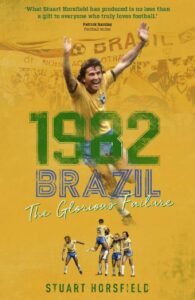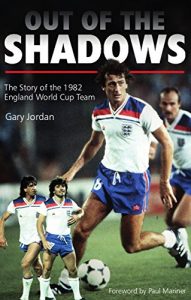Book Review – 1982 Brazil: The Glorious Failure by Stuart Horsfield
 Whilst England fans bemoaned the fact that the Three Lions exited the 1982 World Cup in Spain without losing a game and wondered at what might have been if Trevor Brooking and Kevin Keegan had been fully fit, Stuart Horsfield, then a ten year old boy living in Scarborough was transfixed not by the efforts of his country of birth, but by the football of another nation – Brazil, nicknamed the Seleção (The National Team).
Whilst England fans bemoaned the fact that the Three Lions exited the 1982 World Cup in Spain without losing a game and wondered at what might have been if Trevor Brooking and Kevin Keegan had been fully fit, Stuart Horsfield, then a ten year old boy living in Scarborough was transfixed not by the efforts of his country of birth, but by the football of another nation – Brazil, nicknamed the Seleção (The National Team).
1982 Brazil: The Glorious Failure, is Horsfield’s recollection of that summer 38 years ago, and the 12th edition of the FIFA World Cup in the sweltering Spanish sun. History has come to show that the Brazil side which contained stars such as Sócrates, Zico, Eder and Falcão played some outstanding football that the media, pundits and fans alike believed should have seen them become World Champions in 1982. However, as the record books show, that didn’t come to fruition, with coach Telê Santana’s skilful squad exiting to the pragmatic Italian side, who themselves went onto lift the trophy.
Horsfield builds to that game by providing the reader with a link back to previous Brazilian national sides starting with another infamous game against Italy, that being the 1970 World Cup Final in Mexico. That 4-1 victory for the Seleção is held up as possibly the greatest final in World Cup history, with the likes of Carlos Alberto, Pelé, Rivellino and Jairzinho providing a quality of football that simply overflowed with style, skill and unbridled joy. The author then details how in the following two World Cups (1974 in West Germany and 1978 in Argentina), Brazil lost their way as they tried to adopt a more European style of play, finishing fourth in 1974 and third, four years later.
However, by 1982 there was a return to the Brazilian spirit of 1970, with a freedom in their football, which Horsfield suggests may have been influenced by the political scene in the country as the military dictatorship lessened its grip on power. This uninhibited and talented Brazil squad were drawn in Group 6 in the First Round along with New Zealand, Scotland and the Soviet Union. The author dedicates a chapter to each of these games, with his youthful bewilderment at what he saw evident in the writing. The Seleção won all three games with a brand of football labelled ‘futebol arte’, to advance to the Second Round, which format wise back then, was made up of four groups of three teams, with only the four winners advancing to the semi-finals.
As with the First Round, Horsfield again details each game in a separate chapter, with Argentina and Italy their opponents. Brazil took on their South American rivals in the first match, convincingly winning 3-1. Going into the Italy game, Brazil knew that a draw would have been good enough to see them through to the last four, whilst the Azzurri (The Blues), knew that only a victory would be good enough to progress. With the way Brazil had been playing and with Italy having been uninspiring in the competition up to then, it was assumed by most experts that it would be a straightforward win for captain Sócrates and his team.
The events though at the Sarrià Stadium in Barcelona, didn’t though follow the script, and a Paulo Rossi hat-trick in a pulsating encounter that saw Italy win 3-2, ended the Brazilian dream, in a game that is seen as one of the greatest World Cup encounters of all time. Horsfield captures the drama of the match itself both on the pitch and in the stands and reveals the real sense of loss his ten year old self felt at the exit of Brazil. The book though doesn’t end there though with two final chapters, Aftermath and Legacy concluding this interesting read. A conclusion from those closing chapters is that 1982 pretty much marked the end of free-flowing football being a style to become World Champions, with Brazil adapting to be a more pragmatic in their victories in 1994 (ironically beating Italy on penalties) and in 2002.
Besides, Horsfield’s own recollections of the games, the book is enhanced with contributions from players, coaches and media at the tournament. Within the chapters on each fixture, the use of quotes from television commentary of the time to describe key moments is a nice touch and almost makes the reader instantly want to look them up on YouTube (which the author helpfully lists at the back of the book). If there is a slight criticism, it is that there is sometimes an overuse of metaphor as Horsfield makes a point about a particular player, coach or situation. However, this doesn’t detract greatly from a book that tells an intriguing story and takes the unusual stance of bringing to life a team that despite its enormous talent, will be remembered for being losers and not winners.
(Pitch Publishing. October 2020. Hardback 255 pages)
 For many football fans in England, the 1982 World Cup in Spain is simply remembered for the fact the Three Lions were eliminated from the tournament despite not losing a game: a footnote, nothing more than a pub quiz question. However, there is so much more to this oft repeated simplistic one-line memory of England at the 12th Copa del Mundo Finals.
For many football fans in England, the 1982 World Cup in Spain is simply remembered for the fact the Three Lions were eliminated from the tournament despite not losing a game: a footnote, nothing more than a pub quiz question. However, there is so much more to this oft repeated simplistic one-line memory of England at the 12th Copa del Mundo Finals.